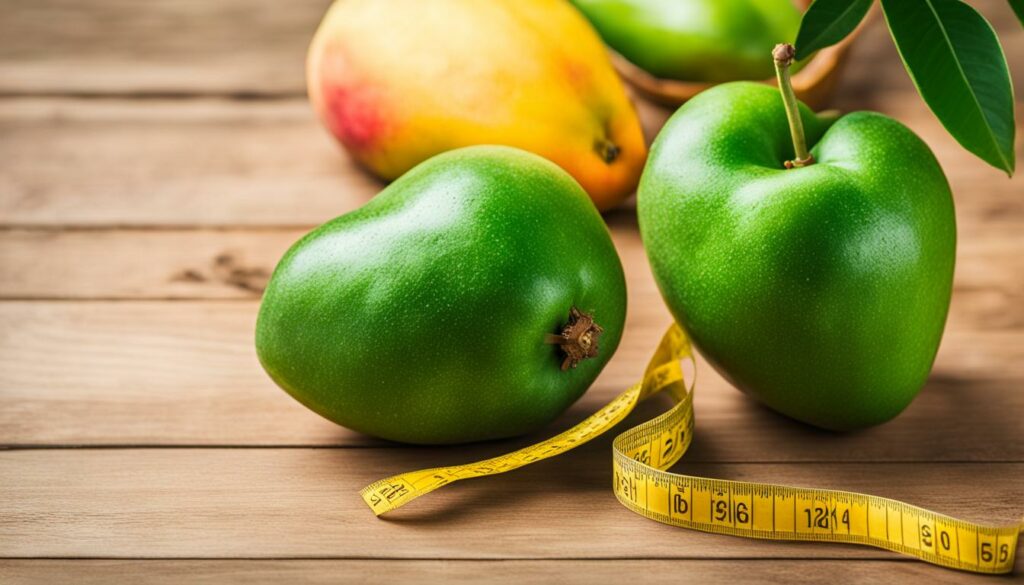Did you know that mangoes have been cultivated for over 4,000 years and are considered the “king of fruits”? This delicious tropical fruit, native to India and Southeast Asia, not only tantalizes your taste buds but also offers a plethora of health benefits.
One cup of fresh mango provides a powerful combination of nutrients, including vitamin C, copper, folate, and vitamin A. But that’s not all – mangoes are low in calories and high in fiber, making them a nutritious choice for maintaining a healthy lifestyle.
Key Takeaways:
- Mangoes have been cultivated for over 4,000 years and are known as the “king of fruits.”
- One cup of fresh mango provides essential nutrients like vitamin C, copper, folate, and vitamin A.
- Mangoes are low in calories and high in fiber, making them a great addition to a healthy diet.
Are you ready to discover the many health benefits of mangoes? In the following sections, we’ll delve into the nutritional profile of mango fruit, explore its incredible impact on immune and heart health, discuss how it promotes digestive and eye health, and even share some mouthwatering mango smoothie recipes.
Get ready to indulge in the goodness of this remarkable fruit!
Packed with Nutrients
One cup of fresh mango contains an array of nutrients that contribute to its nutritional benefits. It provides 99 calories, 1.4 grams of protein, 24.7 grams of carbohydrates, and 0.6 grams of fat. Notably, it is rich in vitamin C, providing 67% of the recommended daily value.
Mangoes are also a good source of copper, folate, vitamin B6, vitamin A, vitamin E, vitamin K, and other vitamins and minerals. These nutrients play important roles in supporting immune function, promoting cell growth and repair, and maintaining overall health.
| Nutrient | Amount | % of Recommended Daily Value |
|---|---|---|
| Calories | 99 | – |
| Protein | 1.4g | – |
| Carbohydrates | 24.7g | – |
| Fat | 0.6g | – |
| Vitamin C | 67% DV | – |
| Copper | – | – |
| Folate | – | – |
| Vitamin B6 | – | – |
| Vitamin A | – | – |
| Vitamin E | – | – |
| Vitamin K | – | – |
| Other vitamins and minerals | – | – |
By incorporating mangoes into your diet, you can easily reap the benefits of these essential nutrients. Whether you enjoy them in a salad, smoothie, or as a refreshing snack, mangoes are a delicious way to support your overall well-being while satisfying your taste buds.

Low in Calories
Despite its sweet taste, mango is surprisingly low in calories. One cup of fresh mango contains fewer than 100 calories, making it a great choice for those looking to reduce their calorie intake.
Mangoes also have a low calorie density, meaning they provide a large volume of food for relatively few calories. This makes them a satisfying snack that can help you feel full and satisfied while still supporting your heart health and overall well-being.

It’s important to note that while mangoes are low in calories, they are high in nutrition. They are packed with essential vitamins, minerals, and fiber that contribute to a healthy diet.
The Nutritional Value of Mangoes
| Nutrient | Amount per 1 cup (165g) |
|---|---|
| Vitamin C | 67% of the recommended daily value |
| Copper | 20% of the recommended daily value |
| Folate | 18% of the recommended daily value |
| Vitamin A | 10% of the recommended daily value |
| Fiber | 2.6 grams |
Mangoes are an excellent source of vitamin C, providing 67% of the daily value. Vitamin C is essential for immune function and has powerful antioxidant properties. Mangoes also contain copper, folate, vitamin A, and fiber, all of which are important for overall health.
Mangoes are not only delicious but also incredibly nutritious. They offer a sweet and satisfying way to support your heart health and maintain a balanced diet.
Supports Immune and Heart Health
Mangoes are a great source of immune-boosting nutrients. They are rich in vitamin C, which is essential for a healthy immune system. Vitamin C helps your body produce disease-fighting white blood cells and supports skin health.
Additionally, mangoes contain other vitamins and minerals that can support immune function, such as copper, folate, and vitamin E. These nutrients work together to protect your body against infections and promote overall immune health.
Moreover, mangoes support heart health due to their high content of magnesium and potassium. These minerals help maintain healthy blood flow, lower blood pressure levels, and reduce the risk of cardiovascular disease.
Promotes Digestive and Eye Health
Mangoes are not only delicious but also offer significant benefits for both digestive and eye health. The enzymes and fiber present in mangoes play a crucial role in supporting a healthy digestive system.
The fiber adds bulk to the stool, promoting regular bowel movements and helping with constipation relief. Incorporating mangoes into your diet can contribute to improved digestive health and overall wellness.
In addition to aiding digestion, mangoes are a rich source of antioxidants, including lutein and zeaxanthin, which are vital for maintaining eye health. These antioxidants have been shown to protect the eyes from harmful blue light emitted by digital devices and reduce the risk of age-related macular degeneration.
By consuming mangoes regularly as part of a balanced diet, you can enhance both digestive and eye health.
Make the most of mangoes’ health benefits by incorporating them into your meals and snacks. Try adding diced mango to your morning cereal or yogurt, blending it into a delicious smoothie, or tossing it into a refreshing summer salad.
With their fiber-rich composition and abundant antioxidants, mangoes are a perfect choice for supporting and maintaining optimal digestive and eye health.
FAQ
What are the benefits of eating mango?
Mango offers a wide range of health benefits. It is packed with nutrients like vitamin C, copper, folate, and vitamin A, which contribute to immune health, heart health, and eye health. Mangoes are also high in antioxidants and fiber, which support digestive health.
What nutrients does mango contain?
Mangoes are rich in various nutrients, including vitamin C, copper, folate, vitamin B6, vitamin A, vitamin E, vitamin K, and others. These nutrients play important roles in supporting immune function, promoting cell growth and repair, and maintaining overall health.
Is mango low in calories?
Yes, mango is surprisingly low in calories. One cup of fresh mango contains fewer than 100 calories, making it a great choice for those looking to reduce their calorie intake. Mangoes also have a low calorie density, meaning they provide a large volume of food for relatively few calories.
How does mango support immune and heart health?
Mangoes are a great source of immune-boosting nutrients, including vitamin C, copper, folate, and vitamin E. These nutrients work together to protect your body against infections and promote overall immune health.
Mangoes also support heart health due to their high content of magnesium and potassium, which help maintain healthy blood flow and lower blood pressure levels.
What are the benefits of mango for digestive and eye health?
Mangoes contain enzymes and fiber that support healthy digestion and can help relieve constipation. The fiber in mangoes adds bulk to the stool and promotes regular bowel movements.
Additionally, mangoes are high in antioxidants, including lutein and zeaxanthin, which are beneficial for eye health and can help protect against age-related macular degeneration.




